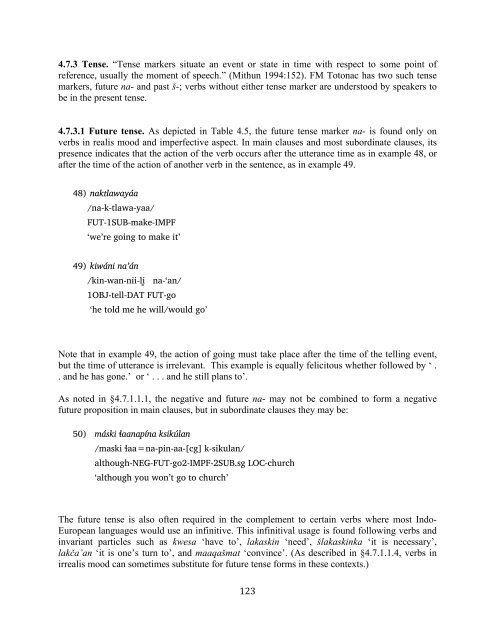The phonology and morphology of Filomeno Mata Totonac
The phonology and morphology of Filomeno Mata Totonac
The phonology and morphology of Filomeno Mata Totonac
Create successful ePaper yourself
Turn your PDF publications into a flip-book with our unique Google optimized e-Paper software.
4.7.3 Tense. “Tense markers situate an event or state in time with respect to some point <strong>of</strong><br />
reference, usually the moment <strong>of</strong> speech.” (Mithun 1994:152). FM <strong>Totonac</strong> has two such tense<br />
markers, future na- <strong>and</strong> past #-; verbs without either tense marker are understood by speakers to<br />
be in the present tense.<br />
4.7.3.1 Future tense. As depicted in Table 4.5, the future tense marker na- is found only on<br />
verbs in realis mood <strong>and</strong> imperfective aspect. In main clauses <strong>and</strong> most subordinate clauses, its<br />
presence indicates that the action <strong>of</strong> the verb occurs after the utterance time as in example 48, or<br />
after the time <strong>of</strong> the action <strong>of</strong> another verb in the sentence, as in example 49.<br />
48) naktlawayáa<br />
/na-k-tlawa-yaa/<br />
FUT-1SUB-make-IMPF<br />
‘we’re going to make it’<br />
49) kiwáni na’án<br />
/kin-wan-nii-li& na-‘an/<br />
1OBJ-tell-DAT FUT-go<br />
‘he told me he will/would go’<br />
Note that in example 49, the action <strong>of</strong> going must take place after the time <strong>of</strong> the telling event,<br />
but the time <strong>of</strong> utterance is irrelevant. This example is equally felicitous whether followed by ‘ .<br />
. <strong>and</strong> he has gone.’ or ‘ . . . <strong>and</strong> he still plans to’.<br />
As noted in §4.7.1.1.1, the negative <strong>and</strong> future na- may not be combined to form a negative<br />
future proposition in main clauses, but in subordinate clauses they may be:<br />
50) máski "aanapína ksikúlan<br />
/maski #aa=na-pin-aa-[cg] k-sikulan/<br />
although-NEG-FUT-go2-IMPF-2SUB.sg LOC-church<br />
‘although you won’t go to church’<br />
<strong>The</strong> future tense is also <strong>of</strong>ten required in the complement to certain verbs where most Indo-<br />
European languages would use an infinitive. This infinitival usage is found following verbs <strong>and</strong><br />
invariant particles such as kwesa ‘have to’, lakaskin ‘need’, #lakaskinka ‘it is necessary’,<br />
lak$a’an ‘it is one’s turn to’, <strong>and</strong> maaqa#mat ‘convince’. (As described in §4.7.1.1.4, verbs in<br />
irrealis mood can sometimes substitute for future tense forms in these contexts.)<br />
! "#'!

















